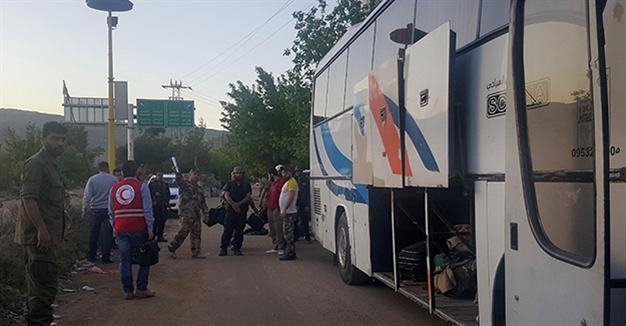UN begins major evacuation in Syria as peace talks fray
ZABADANI - Agence France-Presse

Syrians prepare to board as bus to leave the besieged town of Madaya, on April 20, 2016 during an operation in cooperation with the United Nations to evacuate hundreds of wounded people from besieged Syrian towns - AFP photo
The United Nations began evacuating hundreds of people from besieged Syrian towns in a rare sign of humanitarian progress, as the U.S. Air Force for the first time deployed a B-52 bomber against the Islamic State of Iraq and the Levant (ISIL) group.In Geneva, where UN-brokered peace talks have faltered as a fragile ceasefire has come under strain, the Syrian government meanwhile said it was pushing on with indirect negotiations, calling the opposition's freeze on taking part "absurd theatre".
The anti-government High Negotiations Committee this week suspended its participation in the talks, which do not include either ISIL or Al-Qaeda's Syrian offshoot Al-Nusra Front, until it could see progress on political transition and humanitarian issues.
On the ground, the UN secured the evacuation of dozens of people needing medical attention from four besieged towns on April 20, as part of a complex humanitarian mission, while the U.S.-led coalition upped the ante on the battlefield.
Washington sent in a B-52 bomber to destroy a weapons storage facility south of Mosul, the Pentagon said, days after Defense Secretary Ash Carter announced extra U.S. troops, cash and equipment for the anti-ISIL campaign in Iraq.
In other signs of increasing tempo, U.S. commandos working with Kurdish troops conducted a raid targeting a senior ISIL group figure.
UN spokesman Stephane Dujarric said plans were under way to evacuate some 500 people including the sick, wounded and their family members "in urgent need of life-saving medical attention" from four besieged towns.
On the outskirts of the rebel-held town of Madaya, where dozens of residents starved to death last year, seven large white buses were used to evacuate residents.
Dozens of men, women and children got out of the bus and were checked by security officials before boarding once more, an AFP journalist said.
The evacuations were taking place from rebel-held Zabadani and Madaya near Damascus, and the government-held towns of Fuaa and Kafraya in northwest Idlib province.
Aid deliveries to the four localities always occur simultaneously and in equal amounts, and a similar stipulation applied for those being evacuated.
More than four million in Syria live in besieged or hard-to-reach areas, with limited or no access to food or medical supplies.
The UN has long pressed Damascus to grant unrestricted access to these areas, and has asked all sides to end sieges.
Despite fierce criticism, the regime frequently denies passage to aid convoys or limits what kind of assistance can enter.
The dire humanitarian situation has played a major role in the opposition walking away from the troubled peace talks in Geneva.
An already-shaky ceasefire between the government and non-jihadist rebels was severely strained on April 19 after at least 44 people were killed in air strikes on two markets in northwest Syria.
The deaths of 37 civilians in a market in the city of Maaret al-Numan and another seven killed in nearby Kafranbel were some of the deadliest attacks since the truce took hold on February 27.
On April 19, HNC coordinator Riad Hijab said the opposition delegation could not remain in Switzerland while Syrians were dying on a daily basis.
But the head of Syria's government delegation lambasted the opposition for its move, calling it "absurd theatre" and accusing Hijab of being "politically immature".
Bashar al-Jaafari spoke to journalists after meeting UN mediator Staffan de Mistura's deputy Ramzy Ezzeldin Ramzy.
"The UN considers the talks to be ongoing in spite of the withdrawal," said Jaafari.
The talks are aimed at putting an end to Syria's five-year war with a political transition, a new constitution, and fresh elections by September 2017.
But the main stumbling block remains the fate of President Bashar al-Assad, whom the opposition insists cannot be a part of a transitional government.
The regime, however, says it will only agree to a "broad-based unity government" -- not a transitional body.
Jaafari said the new government would include current government members, as well as "representatives from the opposition... technocrats and independent figures".
He effectively ruled out the HNC, which he described as a group of "extremists, terrorists and mercenaries" working for regional powerhouses Saudi Arabia and Turkey.
Washington said it disagreed with his stance.
"We do not believe... that the way forward is any removal by the opposition from these talks," said US State Department spokesman John Kirby. "In fact, quite the contrary."
The Syria conflict which has cost more than 270,000 lives began as a peaceful revolt demanding democratic change, but evolved into a multi-front civil war after the regime unleashed a brutal crackdown on dissent.
















